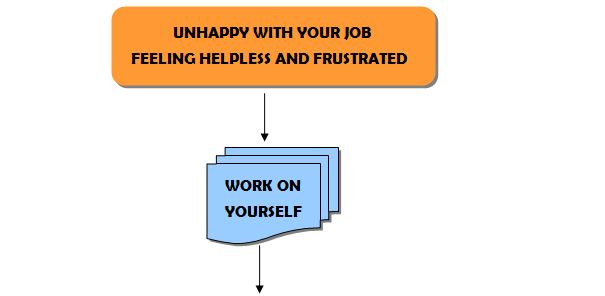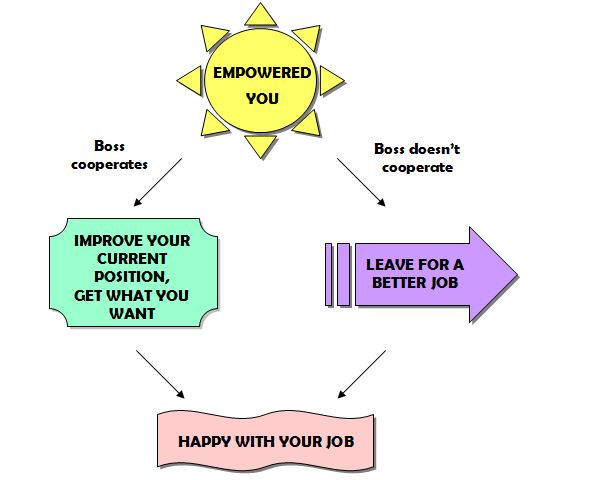
Do you feel stuck at a job that is stressful, meaningless, underpaid, or where you don't feel appreciated? I used to work at a place that checked all the above boxes – it was stressful (I had to work over time every single day in order to meet the norm), meaningless (I worked in an online toy shop which offered thousands upon thousands of children's toys, which I felt supported the consumer mentality and produced loads of plastic waste), underpaid (I had a work load for 2 people and received a salary for one) and I felt unappreciated by my bosses (they didn't care about my superb customer service skills or about the quality of the product translations that I did.
They only cared about how many of those translations I did daily, so that new products could be added to the webshop catalogue. That was the norm they were interested in, nothing else was important to them. They scolded me for working slowly and barely fulfilling the norm, while refusing to take into account the scope of my customer service work, which took a good portion of my day.
I felt very frustrated and was beginning to suffer from burnout, because there was nothing good about that job, no silver lining that I could grab onto. The things that were important to me and that I was good at weren't appreciated. My bosses seemed to care only about the profit, and this was quite repelling to me. I considered it short-sighted too, because the company's bottom line, specially on the long-run, depends on customer satisfaction too. It was obvious that me and the management didn't share the same values, and this distanced me even more from the company's mission. I left at the first given opportunity.
A much better job, but it ended too soon…
After that I had another job, where the salary was much better, I worked part-time, everything was much more relaxed, and I was appreciated for my strengths: my precision, attention to detail and quality control type of work. The only problem is that I didn't feel as part of the team, I felt like nobody cared about my opinion, I wasn't informed about PR events, promotions, or winning contests that our company organized. It was hard because I shared the same office with my boss (there was just the two of us employed), and yet, a minimum amount of information would trickle from him to me about what's going on with the company.
The big boss – who was stationed in another country – never once visited our office in the last year of me working there, but would meet with my immediate boss somewhere in the city. This way I never got a chance to share my opinion and ideas, and I didn't feel like doing it via email but was waiting for the in-person visit. Well, that visit never happened, and eventually I was laid off because the company wasn't doing well, and we had to cut down on expenses. And because of smaller scope of work I wasn't needed any more…
In the months that followed I realized I could have been more proactive while working there. I could have shared my ideas with the big boss via email instead of waiting for him to show up in person. I could have shown that I care, I could have shown more initiative. I guess what stopped me was a sense (and a false belief) that my opinion didn't matter so much. There was a part of me holding back, although another part wanted to be seen. I was lacking assertiveness, I was afraid to share my ideas for improvement. And that could be a part of the reason why it was so easy to fire me – because my value (beyond the administrative work that I was doing) wasn't really visible to my bosses.
Well OK, that's just my musings, it might actually not be true. Maybe they would have fired me anyway, because the costs were simply too high. But nevertheless, it was a wake-up call for me, and it motivated me to work through my self-worth issues. I've learned the importance of assertiveness and self-confidence. Now I'd do it differently…
Job satisfaction depends on 3 factors
These two job experiences helped me realize what is needed for job satisfaction, at least what it is that I need ![]()

For me, it is a job that is:
- meaningful,
- reasonably paid,
- where I feel appreciated and where I can use my talents, and
- with satisfying work conditions.
But I've also learned that job satisfaction depends largely on me and my attitude, because had I been more proactive, I might have had a different job experience.
I actually believe that job satisfaction depends on 3 major factors:
- our own attitude,
- the job itself, and
- our boss and the work conditions.

- Your attitude
You know how some people are in the victim mentality and they tend to complain about everything, including their job, even if the job isn't really that bad at all. But they don't see that, they keep complaining. Research has actually shown that people who are generally unhappy with life are more likely to be unhappy with their job as well. So even if we have the best possible job, and the best boss in the world, we might still be unhappy with our job – if we have a basic negative attitude.
Another problem with our attitude is when we expect our job to fill some unmet need in us. For example, if we lack self-esteem, we might crave appreciation and praise from our superiors, and this might make us behave in immature ways, e.g. we might get offended easily, not react well to constructive criticism, we might accept huge workloads to make us look better, or get into rivalry with our colleagues to prove that we are "the best".
Another less-than-optimal attitude is that we might secretly believe we're too good (or not good enough) for a job, and do it half-heartedly and sabotage ourselves by being sloppy, forgetful and unprofessional.
We might also view our job as just something to pay the bills, so we don't even try to find meaning and value in our work. We might not be interested in building a sense of comradeship with our colleagues. We might be disengaged from our work, unmotivated, not interested in the company's mission, and generally, just waiting for the end of working hours.
Another unhealthy attitude is that we might not value ourselves enough and believe we don't deserve better than the job we're currently at, and so we suffer like I did at the online toyshop.
All the above are examples of how our own attitude can distort and ruin our job satisfaction, or make us stay in a job that we should have left long ago.
- The job itself
The second major factor of job satisfaction is the job itself. There are jobs that are inherently repetitive, or boring, or stressful, and we can't do much about it. That's the nature of the job, and we need to take that into account. For example, if someone likes creativity and change, and works in quality control where they have to repeat the same procedure over and over again, they most likely won't be too thrilled. Or if someone doesn't handle stress well, and they frequently receive last-minute tasks to complete at a moment’s notice, it won't do them good. The job needs to fit our preferences and sensibilities, otherwise we'll be out of sync.
- Your boss and the work conditions
The third major factor of job satisfaction is our boss and the work conditions. We might have a boss who doesn't appreciate us and our ideas. We might need to work overtime without any compensation. We might not be able to take a day off when we need it. Our colleagues might be lazy and uncooperative, etc.
This third category is actually about the relationship between us and our boss, or us and our colleagues. This relationship isn't necessarily set in stone – it can change if we change. For example, our boss might not be an idiot after all, he just might have not noticed us before because we're always silent in meetings, we're not sharing our thoughts and ideas. If we become more assertive, it might turn out that our boss is actually thrilled with our ideas and might even give us a promotion.
Also, if we learn to respect ourselves more and set healthy boundaries, we won't agree to regularly work overtime with no compensation, or to be expected to answer emails on the weekends too. We won't feel self-conscious about our colleague not doing their job properly, and so we won't try to mend the situation by doing their part of the work too. Some of the things that bother and frustrate us at the moment could perhaps change by us taking a different stance. When that happens, our work conditions might actually improve.
Same with our boss: our current experience of our boss may be partially due to our own limitations, not necessarily because of our boss. Of course, it might also turn out that even if we become more assertive, our boss still won't be interested in what we have to say. So he is a jerk after all…. But at least we'll know, and with this new, more assertive attitude and more self-confidence, we won't be afraid to leave our current job and find a better one, where we'll be appreciated and rewarded accordingly.
Here is my youtube video explaining the major causes of job dissatisfaction and offering 10 free coaching sessions for January 2021:
Empower yourself for your dream job
As we can see, out of the three main factors of job satisfaction, two of them – our own attitude and our relationship with our boss and colleagues – largely depend on us. If we want a greater job satisfaction, we need to start with ourselves. We need to take a good look at ourselves and see what it is that we could change in the current situation, what is our responsibility, how we're not stepping up to the plate, or not valuing ourselves enough, or having unrealistic expectations from either ourselves or the people we work with. We also need to go within and see what a meaningful job means to us, what is important to us, what values we aren't willing to compromise, etc. This all is a part of self-observation, which is a crucial first step.
When we've got a measure of self-awareness, we can then start working on our self-improvement, e.g. develop more self-confidence and assertiveness, practice expressing our opinion more freely, and practice setting healthy boundaries with our co-workers, and eventually our boss too. In this process we can work with a coach, who is like a personal assertiveness trainer, helping us get results more quickly and deliberately.


When we develop the assertiveness "muscle" – which means respecting ourselves more, being able to stand up for ourselves more, and knowing what values are important to us – we'll be able to attract – or create – a better job for ourselves.
We'll either create a better work conditions at our current job (we might be treated better, or get paid overtime, or even get a promotion). Or, if our boss isn't open to change and is stuck in a limited mindset, we'll feel ready to leave to some place where they'll value and respect us more. Whatever might be the case, our job satisfaction will improve if we decide to work on ourselves (see the above diagram).
If on the other hand we don't work on ourselves, we'll either stay at our current job, feeling miserable, or we'll keep changing jobs, but always end up frustrated for this or that reason. We'll be repeating the same pattern of having high hopes about the job, later followed by disappointment and frustration.
The only way to break free from that unhealthy dynamic is to put in some self-awareness and self-improvement work. The goal is to become empowered, so that we have more choices and can create the best possible outcome in a given situation.
Becoming empowered – which includes respecting ourselves more, being able to stand up for ourselves, knowing what values are important to us, knowing our boundaries – is one of the key preconditions for job satisfaction. And this is something that WE can influence, not our boss or anybody else.

